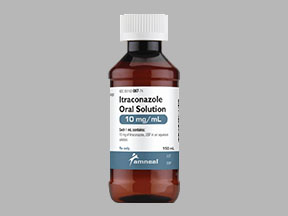
Sporanox Coupons & Savings Card – Discount Prices from $84.72
Brand for: Itraconazole
My prescription
Edit
150ML of 10MG/ML, Itraconazole (1 Bottle)
Select pharmacy

CVS
$84.72
COUPON PRICE
Walgreens
$97.13
COUPON PRICE
Albertsons
$169.38
COUPON PRICE
Walmart
$194.87
COUPON PRICESporanox savings card
Show this card to your pharmacist
CVS
$84.72
BIN
ID
PCN
GRP
019876
LH0D163789
CHIPPO
LHX
Powered by
Related azole antifungals prescriptions
More prescriptions for nail fungus
Related azole antifungals prescriptions
More prescriptions for nail fungus
Sporanox (Itraconazole) dosage forms
Dosage Quantity Price from Per unit 10ML of 10MG/ML 1 Cup $15.32 $15.32 10ML of 10MG/ML 2 Cups $27.16 $13.58 10ML of 10MG/ML 3 Cups $31.58 $10.53
| Dosage | Quantity | Price from | Per unit |
|---|---|---|---|
| 10ML of 10MG/ML | 1 Cup | $15.32 | $15.32 |
| 10ML of 10MG/ML | 2 Cups | $27.16 | $13.58 |
| 10ML of 10MG/ML | 3 Cups | $31.58 | $10.53 |
What is Sporanox used to treat?
Sporanox is used to treat fungal infections. It is commonly prescribed for conditions such as blastomycosis, histoplasmosis, and aspergillosis. It is also used to treat onychomycosis, which is a fungal infection of the nails.
Is Sporanox hard on the liver?
Yes, Sporanox (itraconazole) can be hard on the liver. It has been associated with liver toxicity, and patients taking it should have their liver function monitored regularly. It is important to report any signs of liver problems, such as unusual fatigue, loss of appetite, yellowing of the skin or eyes, or dark urine, to a healthcare provider promptly.
Is Sporanox being discontinued?
As of the latest available information, Sporanox (itraconazole) has not been officially discontinued. However, availability can vary by region and may be subject to change. It is advisable to check with local pharmacies or healthcare providers for the most current information regarding its availability.
How common is liver damage with itraconazole?
Liver damage with itraconazole is considered uncommon, but it can occur. The risk of liver toxicity is generally low, but it is important for patients to have their liver function monitored regularly while on the medication, especially if they have pre-existing liver conditions or are taking other medications that can affect the liver. If any signs of liver dysfunction, such as jaundice, dark urine, or persistent nausea, occur, it is important to contact a healthcare provider promptly.
Is Sporanox still available?
Yes, Sporanox (itraconazole) is still available. It is a prescription medication used to treat certain fungal infections.
